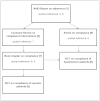50% adherence of patients suffering chronic conditions--where is the evidence?
- PMID: 23255879
- PMCID: PMC3525884
- DOI: 10.3205/000167
50% adherence of patients suffering chronic conditions--where is the evidence?
Abstract
The World Health Organization states that in a widespread report that "in developed countries, adherence among patients suffering chronic diseases averages only 50%". We followed the quoted references to this statement. The data basis for this statement is one randomized controlled trial (RCT) on hypertensive steel workers in Canada published in 1975 and one study dealing with neurotic outpatients in Pennsylvania, USA published in 1965. Both studies are not suitable to assume such generalized adherence estimation and are not for different reasons transferable to today's patient care.
Die Weltgesundheitsorganisation (WHO) gibt in einem sehr verbreiteten Bericht an, dass die Therapietreue bei Patienten mit chronischen Erkrankungen bei durchschnittlich 50% in entwickelten Ländern liegt. Wir haben anhand der Literaturhinweise die Basis dieser Aussage verfolgt. Die Basis dieser Aussage ist lediglich eine randomisierte kontrollierte Studie (RCT) an kanadischen Stahlarbeitern mit Hypertension von 1975 sowie eine US-amerikanische Studie an neurotischen Patienten von 1965. Beide Studien sind nicht geeignet eine derart generalisierte Aussage zu treffen und darüber hinaus nicht auf die gegenwärtige Patientenversorgung übertragbar.
Keywords: behavior; chronic disease; evidence-based medicine; information science; medication adherence; patient compliance.
References
-
- World Health Organisation. Adherence to long-term therapies: evidence for action. Geneva: WHO; 2003. Available from: http://www.who.int/chp/knowledge/publications/adherence_report/en/
-
- Defulio A, Silverman K. The use of incentives to reinforce medication adherence. Prev Med. 2012 Nov;55 Suppl:S86–S94. doi: 10.1016/j.ypmed.2012.04.017. Available from: http://dx.doi.org/10.1016/j.ypmed.2012.04.017. - DOI - DOI - PMC - PubMed
-
- Brown MT, Bussell JK. Medication adherence: WHO cares? Mayo Clin Proc. 2011 Apr;86(4):304–314. doi: 10.4065/mcp.2010.0575. Available from: http://dx.doi.org/10.4065/mcp.2010.0575. - DOI - DOI - PMC - PubMed
-
- O'Carroll R, Dennis M, Johnston M, Sudlow C. Improving adherence to medication in stroke survivors (IAMSS): a randomised controlled trial: study protocol. BMC Neurol. 2010 Feb 24;10:15. doi: 10.1186/1471-2377-10-15. Available from: http://dx.doi.org/10.1186/1471-2377-10-15. - DOI - DOI - PMC - PubMed
-
- Haynes RB, Montague P, Oliver T, McKibbon KA, Brouwers MC, Kanani R. Interventions for helping patients to follow prescriptions for medications. Cochrane Database Syst Rev. 2001;(1):CD000011. doi: 10.1002/14651858.CD000011. Available from: http://dx.doi.org/10.1002/14651858.CD000011. - DOI - DOI - PubMed
Publication types
MeSH terms
Substances
LinkOut - more resources
Full Text Sources
Medical


